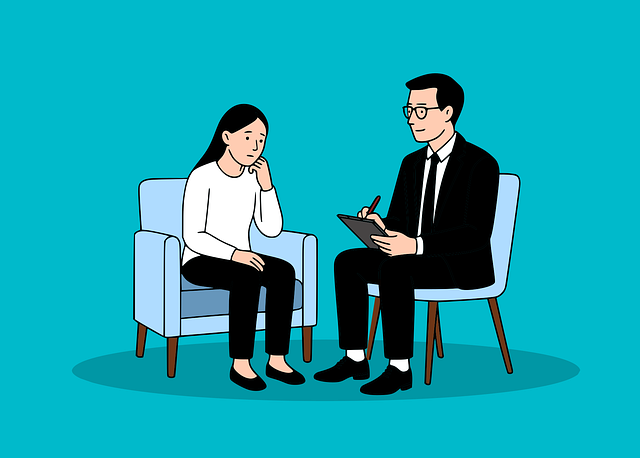Early recognition of adolescent anxiety is crucial. Look for behavioral and physical signs like irritability, concentration issues, headaches, sleep problems, social withdrawal, and excessive worry. If symptoms persist over two weeks, consider teen anxiety counseling to address root causes through evidence-based techniques, group support, and family interventions. Holistic approaches including medication, mindfulness, yoga, and CBT complement therapy. Support involves creating safe spaces for dialogue and integrating professional guidance for coping mechanisms and stress management.
Adolescent anxiety is a growing concern, but recognizing when to seek professional help is crucial. This comprehensive guide explores the signs, strategies, and support systems for navigating teen anxiety effectively. Understanding when self-help measures fail is essential in determining the appropriate time to access specialized services like anxiety counseling for teens. From identifying symptoms to fostering a healing environment, this article provides insights for parents and caregivers guiding teens through anxiety disorders.
Recognizing Signs of Teen Anxiety
Recognizing signs of adolescent anxiety is crucial, as it enables parents and caregivers to intervene early. Teens experiencing anxiety may display various behavioral changes, such as persistent irritability, restlessness, or difficulty concentrating. They might also exhibit physical symptoms like frequent headaches, stomach aches, or sleep disturbances. Social withdrawal, avoidance of activities they once enjoyed, and excessive worrying about school performance or future events are red flags. Some teens may engage in self-soothing behaviors like excessive grooming or repetitive actions (e.g., handwashing). If you notice these signs persisting for more than two weeks, it might be time to consider anxiety counseling for teens as a supportive step towards better mental health.
When Self-Help Strategies Fail
For many adolescents, managing anxiety through self-help strategies such as mindfulness exercises or cognitive reframing can be beneficial and empowering. However, if these approaches prove insufficient in alleviating symptoms, it may be a sign that professional help is needed. Anxiety counseling for teens plays a crucial role in addressing underlying causes and developing effective coping mechanisms.
Counseling provides a safe space for adolescents to express their fears, worries, and experiences without judgment. Trained mental health professionals employ evidence-based therapeutic techniques tailored to the unique needs of young individuals. Through therapy, teenagers can learn to identify triggers, understand their anxiety responses, and acquire tools to manage symptoms effectively in their daily lives. This supportive environment fosters growth, resilience, and improved overall well-being.
Types of Professional Help Available
Anxiety counseling for teens is a specialized service designed to address the unique challenges faced by adolescents struggling with anxiety disorders. This can include individual therapy, group sessions, or family-focused interventions led by licensed mental health professionals such as psychologists, psychiatrists, and social workers. Individual therapy provides a safe space for teens to explore triggers, learn coping mechanisms, and build resilience. Group therapy offers peer support and the opportunity to share experiences with others facing similar challenges. Family therapy involves parents or caregivers in the process, aiming to strengthen family connections and improve communication dynamics that can impact an adolescent’s anxiety levels.
Professional help also extends beyond traditional therapy. Some options include medication management, where a psychiatrist prescribes medications such as selective serotonin reuptake inhibitors (SSRIs) or buspirone, which have shown effectiveness in treating anxiety disorders. Additionally, alternative therapies like mindfulness-based stress reduction (MBSR), yoga, and cognitive behavioral therapy (CBT) are gaining recognition for their potential to reduce symptoms of anxiety. These approaches often complement traditional counseling, providing teens with a holistic approach to managing their anxiety.
Supporting Your Teen's Healing Journey
Supporting your teen on their healing journey is a crucial aspect of addressing adolescent anxiety effectively. Firstly, create a safe and non-judgmental environment where they feel comfortable discussing their feelings and concerns openly. Encourage them to express their emotions, whether it’s fear, worry, or frustration, without fear of criticism. This open dialogue forms the foundation for healing and fosters trust between you and your teen.
Next, consider incorporating anxiety counseling for teens into their support system. Professional therapists specializing in adolescent anxiety can provide valuable tools and strategies tailored to your teen’s unique needs. Through therapy sessions, they can learn coping mechanisms, challenge negative thought patterns, and develop healthier ways of managing stress. Remember, supporting your teen on this journey involves both active listening and seeking professional guidance when necessary.
If self-help strategies prove ineffective or your teen’s anxiety significantly impacts their daily life, it’s crucial to consider professional help. Anxiety counseling for teens can provide specialized support and evidence-based treatments tailored to their unique needs. By engaging in therapy, adolescents and their families can learn coping mechanisms, gain insights into underlying causes, and develop effective strategies to manage anxiety over the long term. Remember, seeking professional assistance is a proactive step towards your teen’s mental well-being and a crucial element of their healing journey.
